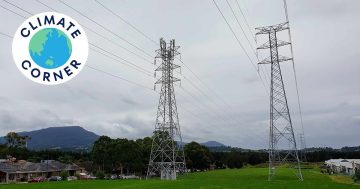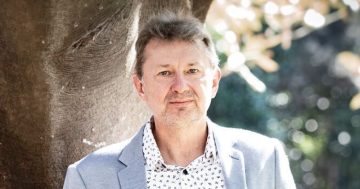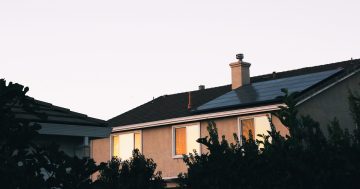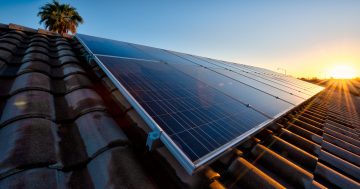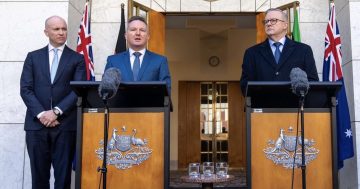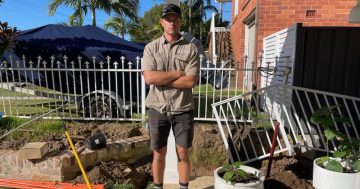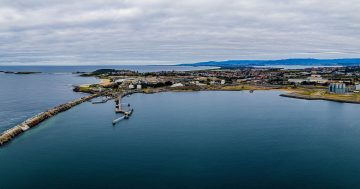
Former miner Charles Taylor (right) with an unknown colleague at the Brimstone Colliery near Camden. Photo: Supplied.
A retired South Coast mine manager who spent his working life in the energy sector has predicted widespread blackouts if government fails to embrace nuclear energy.
“Labor is procrastinating on this issue to the point of bloody-mindedness, and if it continues all I see in the end is an unreliable energy industry struggling with blackouts,” said Thirroul’s Charles Taylor.
His comments come a day after national media reported that Treasurer Jim Chalmers had described the Coalition’s embrace of nuclear power as “economic insanity”.
Mr Chalmers called for Opposition Leader Peter Dutton to release more details on the plan to build seven nuclear plants on the sites of former coal-fired power stations by mid-century.
These comments also follow the recent announcement that Russell Vale Colliery has gone into maintenance and care mode, signaling its closure in line with Labor’s plan to close four of NSW’s five coal-fired power stations by 2035.
Mr Taylor spent four years underground at Bulli Colliery in the 60s before rising up the ranks to manager of six collieries in NSW and one in Queensland during a 40-year career.
He is concerned that the government’s negative stance on nuclear energy “will end up driving this country into the ground” with a substandard energy industry.
At 84, sharp and engaged in both national and international politics, Mr Taylor acknowledges that coal-fired power stations have had their day, but he is disturbed by what is on the table.
“I have nothing against renewables per se, but the NSW energy roadmap that proposes a mix of questionable renewables that supposedly will be up and running by 2035 just doesn’t stack up economically or in practical terms,” he said.
“The proposed wind farm, for example, is going to be a disaster for the coast that is renowned for its views.
“And the maintenance and connection costs to the grid will be exorbitant. Even more disturbing is that the expected lifespan of these turbines is about 25 years so how do we then dispose of these enormous structures – nobody is talking about that.

Mr Taylor during his time working in the mines. Photo: Supplied.
“Australia has to move with the times … many parts of the world, including China, India and Japan, have gone nuclear with only rare complications.
“They have proved that once established, nuclear is an efficient and reliable source of energy without the coal price fluctuations we see today.”
Mr Taylor believes the argument that nuclear will be too expensive and will take too long to build is muddying the waters.
“In the long run, with a life of about 100 years, it will serve us better with a reliable source of energy,” he said.
When asked for a response, University of Wollongong’s energy authority Ty Christopher said the divisive for/against narrative in Australia regarding nuclear energy and renewables needed to be seen for what it was – a political construct designed to differentiate political parties, fanned by a media obsessed with conflict.
“It is reasonable, when you look at the facts, to be in favour of renewables and nuclear energy as part of an overall decarbonised energy system,” he said.
“We do, however, need to be realistic regarding the costs, timing, risk and benefits of all technologies and the energy mix.
“Concerns over maintenance of renewable technologies such as offshore wind are challenged by the actual experience in Europe where the technology has been reliably delivering affordable electricity for the past 30 years.
“In 2023, Australia saw renewables deliver nearly 40 per cent of our energy safely and reliably, and the lights stayed on. Offshore wind turbines deliver an availability of 50 per cent or more. Ageing coal-fired power stations are now struggling to deliver a capacity factor of better than 60 per cent.
“In simple terms, renewable technology is reliable enough to meet our needs now, and according to the CSIRO, renewables are the cheapest form of electricity generation available.”
He added that the two major challenges with nuclear energy were the expense and the lengthy time it took to get a nuclear power industry established which, based on international experience, could take 15-20 years in a working democracy opposed to much less under a totalitarian government.











